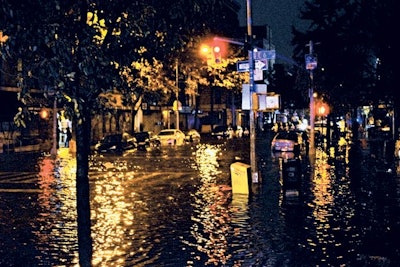
There’s no way to prevent Mother Nature’s wrath, but the wreckage left in the wake of Superstorm Sandy has some people asking if they should be doing more to shield their events from the economic fallout of severe weather by purchasing insurance for cancellation on account of weather.
“I actually do think it would be beneficial to have a conversation about insurance and when we should look at evaluating the cost benefit,” says Jill Pendergast, senior producer for the D: All Things Digital conference series. Organizers had to cancel their New York City D: Dive Into Mobile conference when the area where it was being held was evacuated during the storm.
“Maybe it’s something more of us planners should start looking at across the board,” she says.
The facility and some vendors were willing to roll over the group’s deposit to the rebooked conference scheduled for April, but they still incurred losses, Pendergast says. “We’re trying to find a happy medium of what’s fair, like what food and florals were already bought,” she says. Marketing materials had been created and distributed months before, and audiovisual needs had already been set up when the order to evacuate came. “There’s a lot of sunk costs that you lose."
The disruption caused by Sandy in a city that doesn’t typically endure that type of severe weather exposed unexpected vulnerabilities. “It’s not even so much a question of how is the weather going to affect my event, but is there going to be a transportation stoppage or power outage?” says Jaclyn Bernstein, president and partner at Empire Force Events in New York. “I think those potentially planning events for this time next year maybe are thinking about that now.”
This seems to be the case. Insurance brokers say they’ve seen an increase of about 15 percent in the number of calls they’re receiving about weather-related cancellation coverage.
“We’re probably getting 20 to 30 calls a week,” says Jaimee Goehring, a broker in the special events division at Doodson Insurance Brokerage L.L.C. “People have been asking about the weather aspect, like what different kinds of weather are covered.”
Insurance for event cancellation in the event of severe weather is usually its own separate policy. It’s different from the general liability insurance most planners carry, which Amaury Rentas, primary broker at EventsInsurance.com, says sometimes causes confusion.
“The biggest misconception is that the standard liability should cover everything,” she says. Another is assuming that any bad weather will be covered; in fact, the policy has to specify what particular events—named hurricanes, for example—need to happen for it to pay out.
Planners who have taken out weather policies and needed to use them say the insurance is an invaluable safety net. Jasmine Nielsen, executive director of AIDS-education nonprofit Love Heals, takes out an insurance policy every year for an annual outdoor event the group holds at a horse farm in the Hamptons.
In 2006, when the field flooded so heavily that technicians couldn’t run electricity to the tented area, Nielsen had to cancel. Three years prior, the weather was bad enough that her insurance paid out even though she didn’t cancel the event, which covered the added expense she incurred from having to hire tow trucks to pull stranded cars out of a waterlogged field.
But these policies aren’t cheap, Nielsen says. “It’s a delicate balance you as a manager have to strike in hedging your bets when you’re looking at the bottom line.” She estimates her policy costs between two and three percent of the dollar amount she covers. Goehring says most cancellation policies fall between one and three percent.
It’s not just the cost that acts as a deterrent. Right now, planners are more concerned with recovering deposits and rescheduling canceled events than devoting time to researching insurance.
And as time passes, the sense of urgency fades, Bernstein says: “We have a short-term memory sometimes.”
Even Pendergast, the All Things Digital planner, says, “You live through it and you kind of forget about it.”



















